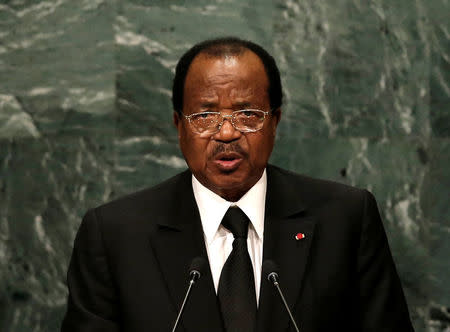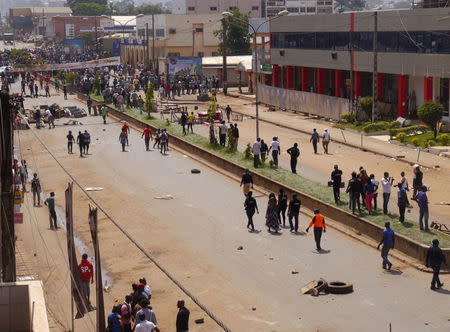Cameroon president orders case dropped against Anglophone protesters
By Anne-Mireille Nzouankeu YAOUNDE (Reuters) - Cameroon's president on Wednesday ordered a military court to drop its prosecution of three Anglophone activists and some of their supporters in a bid to ease tensions in the central African nation's minority English-speaking regions. The men - Felix Agbor Balla, Fontem Aforteka'a Neba and Paul Ayah Abine - were arrested following protests late last year by English speakers demanding equal treatment in the majority Francophone country. The case, tried under anti-terrorism laws enacted to combat Islamist Boko Haram militants in the north, stoked tensions in the North-West and South-West regions, further fuelling opposition to President Paul Biya's mainly French-speaking government. "This decision (to end the prosecution) stems from the Head of State's firm resolve to continuously explore ways and means to seeking a peaceful solution to crises," read a statement released by the secretary general of the presidency. The activists pleaded not guilty in February to charges that included complicity in hostility against the homeland, secession, civil war, and campaigning for federalism. They had faced a potential death sentence if convicted. The move to end the trial came amid a growing wave of pressure - including from church officials, diplomats and a popular online campaign - calling for the detainees' release. "It's a good thing. But an end of prosecution does not mean immediate release. They must be released immediately," Christopher Ndong, a member of the activists' defense team, told Reuters. The presidency's statement did not say when, or even if, the prisoners would be freed and reaffirmed Biya's commitment to combat "all enemies of peace and progress". "They will be brought before the courts," the statement said. Rights groups have raised concerns about a rising wave of repression during Biya's 35-year rule. The government's main reaction to the simmering unrest has been to collectively crack down on the Anglophone regions. Security forces have shot dead at least six people and arrested hundreds of others. Internet connections were cut for three months, and earlier this week authorities announced a ban on broadcasts of a South Africa-based channel, SCBC, claiming it was a propaganda arm of an outlawed secessionist movement. At the end of World War One, the League of Nations divided the former German colony of Kamerun between the allied French and British victors. At independence in 1960, English-speaking voters opted to join Cameroon rather than neighboring Nigeria, but they have since complained of being marginalized. (This story corrects identity of one of the activists in 2nd paragraph.) (Additional reporting by Josiane Kouagheu in Yaounde and Bate Felix in Paris; writing by Joe Bavier; editing by Larry King)


